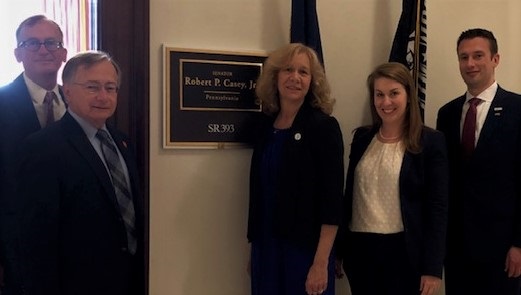Subscribe for Weekly Updates

CPAs Advocate for Tax Policy Upgrades in Washington
 By Nicholas
J. Crocetti, CPA
By Nicholas
J. Crocetti, CPA
I had the pleasure of recently attending the AICPA Council Meeting in Washington, D.C. Several issues discussed at the conference are important to both the AICPA and the state societies. In fact, the topics presented below were discussed with members of the U.S. Senate and House by members of the various state societies. We at the PICPA met with some of our representatives from Pennsylvania and shared our view on the four topics below.
 Modernize Taxpayer Services with a Practitioner Services Division
Modernize Taxpayer Services with a Practitioner Services Division
On April 18, 2019, the IRS announced a multiyear plan – the IRS Integrated Modernization Business Plan – that focuses on taxpayer experience and services, enforcement, and modernized IRS operations.
As part of the plan, the agency should consolidate existing tax practitioner services into a dedicated Practitioner Services Division to ensure that all represented taxpayers receive the assistance they need. Over half of all taxpayers choose tax preparers to advise them on tax matters, assist them with compliance responsibilities, or represent them before the IRS.
The Practitioner Services Division will enhance and centrally manage the many disparate practitioner-impacting programs, processes, and tools for the resolution of taxpayer issues. It will also streamline the structure of the IRS, minimizing the duplication
of services and improving the taxpayer experience.
[Update: IRS Commissioner Charles Retigg announced he is considering the proposal.]
Fiscal State of the Nation
The Treasury Department has been preparing consolidated federal financial statements for about 20 years, and the Government Accountability Office (GAO) performed its first audit of those financial statements with the 1996 federal fiscal year. The financial statements and the GAO’s audit report provide valuable information regarding the financial condition of the federal government for policymakers that is often overlooked.
U.S. Reps. Kathleen Rice (D-N.Y.) and Andy Barr (R-Ky.) are expected to introduce a Fiscal State of the Nation resolution, which would require the Comptroller General to give a presentation to a joint session of the House and Senate Budget Committees on the GAO’s audited federal financial statements, together with an analysis of its financial position and condition.
The accounting profession strongly supports this resolution. It will foster more transparency about the information included in the federal government's financial report, and it will provide Congress with important perspective on the nation's fiscal health beyond what's included in the annual federal budget.
Timely Issuance of IRS Disaster Relief
Every year, clients (and CPAs) are affected by disasters in our country. Unfortunately, IRS filing relief for taxpayers following a disaster often arrives shortly before or after the filing deadlines, causing taxpayers and tax practitioners unnecessary stress and burden in the days leading up to the issuance of the filing relief.
State governors issue official disaster declarations promptly, but often presidential disaster declarations (by FEMA) in those same regions are not declared for days, or sometimes weeks, after the state declaration. This process delays the IRS's ability to provide federal tax relief to impacted businesses and disaster victims.
State declarations often include evacuation warnings for a range of counties expected to be affected. After the disaster occurs, FEMA assesses the damage and offers a federal declaration to those counties ultimately affected by the disaster, not necessarily all the counties that were warned to evacuate by the state. Initial filing relief provided by the IRS is limited to FEMA declared counties, excluding counties with taxpayers and CPAs who also evacuated in anticipation of a disaster.
Congress should grant the IRS authority to quickly postpone certain deadlines in response to state-declared disasters, allowing the IRS to offer victims the certainty they need as soon as possible. Presently, Senate Bill 1677 and House Bill 2976 are in process to support this issue.
Taxation of the Digital Economy
The advancement of technology and the digital economy presents complex and unique tax challenges for tax authorities and governments, making taxation of the digital economy a global hot topic. In October 2018, the AICPA developed a policy paper on taxation of the digital economy that lays out fundamental concepts in this area.
The policy paper acknowledges the efforts of various international bodies, and encourages the following:
- Agreements among various countries to work digital economy taxation issues through entities such as the Organization for Economic Cooperation and Development (OECD), rather than unilaterally.
- Policies and platforms that are relatively easy for tax authorities to administer and for businesses to comply with.
- Mechanisms to resolve controversies.
- Elimination of the double taxation of value or income.
- Adherence to existing global standards and tax treaties.
The AICPA is actively engaged in the discussions taking place within the international tax community on these issues and is available to act as a resource on the various proposals as they are developed.
Nicholas J. Crocetti, CPA, is a retired managing director of CBIZ MHM LLC in Plymouth Meeting, Pa. He is a frequent speaker at PICPA tax conferences and just completed a two-year term as a member of AICPA Council.
Sign up for weekly professional and technical updates in PICPA's blogs, podcasts, and discussion board topics by completing the form here.







Leave a commentOrder by
Newest on top Oldest on top